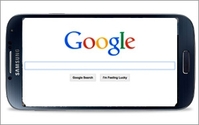Commentary
Google Looks Toward 'Other' Markets To Offset Slowing Paid-Search Clicks
- by Laurie Sullivan , Staff Writer @lauriesullivan, October 17, 2014
 During the earnings call with investors and analysts Thursday, Google showed signs that its profitable search engine advertising business has begun to slow. The company's focus on other
markets like YouTube content, biotech and hardware clearly signals an attempt to offset seasonal declines in search, but the biggest issue that many heard on the call is a declining cost per
click.
During the earnings call with investors and analysts Thursday, Google showed signs that its profitable search engine advertising business has begun to slow. The company's focus on other
markets like YouTube content, biotech and hardware clearly signals an attempt to offset seasonal declines in search, but the biggest issue that many heard on the call is a declining cost per
click.
Spending less per click seems to be great news for advertisers but not for Google because it cuts into profits. CPCs fell 2% in Q3 2014 compared with the year-ago quarter. Company executives have been trying for years to steer analysts away from clicks as a defining metric. One possible reason: as Internet-connected devices move in to support search marketing, other metrics will take its place. Revenue reported as "other" came to $1.84 billion, or 11%, in the third quarter -- representing a 50% increase year-on-year.
RBC Capital Markets Analyst Mark Mahaney, in a report published Thursday night, called the 17% overall paid-search click growth "weak," but the 24% that Google reported for paid-click growth on owned and operated sites was not. He said the 2% year-on-year CPC decline was the lowest since 2011, but vertical search efforts and mobile search adoption rates are helping to stabilize earnings.
Google's profits will depend on mobile. Google does not disclose the amount that brand marketers and their agency partners spend on mobile advertising versus desktop, but numerous studies released this week show a clear path for budgets moving from desktop to mobile.
Marin Software has released numbers that show desktops lost 8.5% click share compared with the prior year, while smartphones took 6.1%. Advertisers devote just more than 42% of all spend to mobile devices, and conversions on the devices make up about 30% of search conversions. Apparently, advertisers still have trouble tracking conversions.
Mobile clicks may convert into store purchases or saved references for later at-home purchases on a desktop, per Marin. While smartphone spend outpaces clicks and conversions, Marin sees the opposite happening with tablets -- which makes up only 8% of ad spend -- but 15% of clicks and 12.4% of conversions.
Google accounted for 38.6% mobile market share in 2013, down from 47.2% in 2012, per eMarketer. The total U.S. mobile advertising market will reach $18.75 billion in 2014, up from $10.42 billion in 2013. eMarketers estimates that this year Google's share will drop slightly to 37.7%.
The engine's share of total U.S. search ad spend -- including desktop and mobile -- was 71.6% in 2013, compared with 9.2% for Bing and 6.1% for Yahoo, per the data firm. The U.S. search advertising market totaled $20.3 billion in 2013, and should reach $22.87 billion in 2014.




So, what is Google's real CPC average?